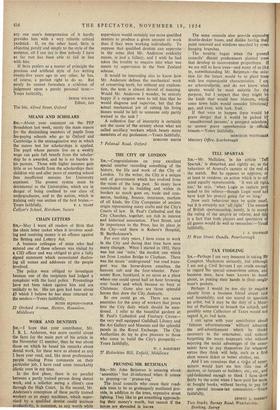WORK AND DENTISTS SIR,—I hope that your contributor, Mr. I.
R. L. Anderson, was more careful about the facts for the main part of his article in the November 12 number, than he was about those on which he based his remarks about dental work, for these were as absurd as any I have ever read, and, like most professional people reading Press comments on their particular job, I have read some remarkably idiotic ones in my time.
In the first place, there is no parallel between a partly trained person doing dental work, and a solicitor seeing a client's case through the High Court. In the second, Mr, Anderson's conception of these partly trained workers as so mapy machines, which super- vised by a qualified dentist could increase productivity, is nonsense, as any worth while
supervision would certainly use more qualified dentists to produce a given amount of work than if they were working individually. To suppose that qualified dentists can superyise in the sense that Mr. Anderson evidently means, is just a fallacy, and I wish he had taken the trouble to enquire into what was meant by supervision in the New Zealand scheme.
It would be interesting also to know how Mr. Anderson defines the mechanical work of conserving teeth, for without any explana- tion, the term is almost devoid of meaning. Would Mr. Anderson I wonder, be entirely happy if a surgeon were to tell him that he would diagnose and supervise, but that the actual mechanical job of cutting his living tissues would be left to someone only partly trained in the task ?
A collective fear of insecurity is certainly not the cause of the anxiety about what are called ancillary workers which besets many members of my profession.—Yours faithfully, DOROTHY SMITH 7 Polstead Road, Oxford










































































 Previous page
Previous page